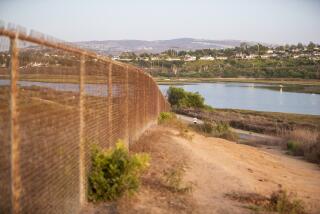It’s Not Money That Matters to Florida Man
- Share via
NAPLES, Fla. — Out in a scrubby, muggy patch of former swampland, Jesse James Hardy owns everything under the sunrises that stretch from a horizon of slash pine and palm trees.
He owns all that’s under the stars in the summer sky, including millions of mosquitoes and gnats that swarm the still air.
He owns a well he dug 60 feet down that provides what he calls the best-tasting water in Florida. And he owns a simple clapboard house he built himself -- after a wildfire tore apart the last one.
“It ain’t been an easy life, but I love it. I really do. This is my home,” said Hardy, 68. “I couldn’t trade it for nowhere else. It’s irreplaceable.”
But Hardy’s 160 acres sit in the path of what is perhaps the nation’s most ambitious environmental project, a 30-year effort to restore the natural water flow to the Everglades.
For years, state officials have quietly negotiated with Hardy on a price for a piece of land that many consider worthless -- and one man considers priceless. He has adamantly refused, even as the offers have doubled and tripled into millions of dollars.
Restoring the Everglades means turning his land back to its natural state as a flooded plain, before farmers and developers backfilled, dredged and carved canals through an ecosystem that once stretched uninterrupted from a chain of lakes near Orlando to the Florida Bay.
Backers say the project would revive birds, fish and other wildlife essential for tourism, and improve the water supply for surrounding communities.
“There’s a lot of overwhelming public benefit,” said Ernie Barnett, the state Department of Environmental Protection’s director of ecosystem projects.
But Hardy insists that he’s staying put, even if it means passing up millions.
“It’s nothing fancy, but what I’m telling you is I live all right,” he said. “I don’t have to have gold-plated plumbing to take a shower. I got it better than people living in town. Of course, a lot of people won’t live like this.”
The former Navy SEAL’s homestead on the edge of what were once Everglades wetlands is hidden 40 miles east of downtown Naples, but seemingly a million miles from the development of Florida’s southern coast.
Hardy bought the property for $60,000 in 1976. “I bought it because it was cheap ... ,” he said. “There wasn’t any people here. It was just very serene, clean, fresh, quiet. It was just a real beautiful place.”
Since then, Hardy has tamed his wilderness, largely for a 9-year-old boy he considers his son. Tommy Hilton and his mother Tara, a family friend, came to live with Hardy five months after the boy was born.
Hardy said he and Tara are not romantically involved. She works for him, helping him check the trucks that buy the lime rock off his property and haul it away. Disability from the military covers the rest of the bills.
“What little boy wouldn’t want to grow up here?” Hardy asked. Piles of toys -- model cars and trucks, a tent, bicycle and basketball hoop -- fill most of the front porch, where tattered screens long ago gave up their fight against a steady stream of bugs. “The dirtier you are, the less they’ll mess with you,” Hardy said, unaffected by the sand gnats swarming about.
But the place, if anything, seems tidy. Hardy, slim and agile, wipes his sandaled feet on a doormat before taking the three steps into his home and has a laundry line full of clean gray T-shirts and camouflage pants -- his uniform of choice after 14 years in the Navy. Only Hardy’s scruffy gray beard makes him look the part of a rural recluse.
As his clash with the state garners more attention, Hardy is becoming sensitive to the way recent news stories depict him and his home. One referred to his “collections” as trash heaps.
“There ain’t no trash around here,” Hardy said defensively, as he swung his arm toward a yard full of old cars. “I happen to like old Chevrolets. I built that truck over there. And I use that one right there for parts. They all are here for a reason.”
Propane tanks keep his refrigerator and stove running so he can make grits, sausage and eggs for breakfast before driving Tommy to a bus stop for school. Since there’s no electricity, solar power and a generator provide energy for a window-mounted air-conditioning unit that’s rarely used, a washing machine and heat in the cool winters.
A few years back, when the restoration was just a proposal, the state offered Hardy $711,000. Hardy still seems insulted: “They’re wanting to get all the humans off the land and turn it back to wildlife, and they don’t even know if it’s going to work. They want to take this away from me and that little boy.”
State officials have kept trying, offering to swap his land with a similar stretch a little farther from the Everglades. They gradually increased their offer until last month, when it reached $4.5 million -- a figure that state officials acknowledge is probably more than the land is worth.
Friend Pat Humphries said the increasing offers made no difference. “People think he’s holding out for more money. But this land really means the whole world to him, second only to his son,” said Humphries, whose husband trained in the SEALS with Hardy.
The millions Hardy has been offered seem like pennies compared with the $8.4-billion restoration, which aims to link a vast ecosystem of tranquil waters, saw-grass prairies and towering cypress. Once restored, Hardy’s property and the surrounding areas would rejoin Picayune Strand State Forest and link four reserves that surround it, including the Florida Panther Wildlife Refuge and 10,000 Islands National Wildlife Refuge.
Habitat would be restored for the endangered Florida panther, West Indian manatee, red-cockaded woodpecker and other birds. “The overriding importance is that the entire Everglades Restoration Plan requires this parcel to get started,” said Barnett, of the Department of Environmental Protection. “We’re plugging canals to restore the natural water flow and his land will no longer be dry. He would be flooded, and we cannot legally allow anyone on private property to be in harm’s way.”
Officials recently threatened to seize the land under eminent domain, which allows government to take private land for a public purpose. But Gov. Jeb Bush and environmental officials have said they want to avoid going to court.
At a recent meeting in Tallahassee, they heard Hilton and Tommy plead Hardy’s case as he recovered from treatment for prostate cancer.
Afterward, “Tommy told me, ‘Dad, you’re going to win. I could tell that he liked me. He had a nice, soft voice,’ ” Hardy said.
But it seems as if Tommy is the only optimist. The more money state officials offer for Hardy’s property, the more intransigent he becomes. He has had little use for government since he was a boy, when his father died and his mother received no help to support him and his brother.
“There was no food stamps. My mother washed clothes to take care of us,” he said. “They didn’t give me nothing then. All they do is take away, take away.”
But Hardy’s anger fades as he wanders his property. He shows off the pond that he hopes to turn into a fish-farming business, and another where he and Tommy fish in the shade.
This land has become his life.
“The Everglades is 60 miles east of here. This has nothing to do with the Everglades,” Hardy said. “I’m out here. Nobody even knows. Please, tell them, ‘Please, just leave me alone.’ That’s all I want.”
More to Read
Sign up for Essential California
The most important California stories and recommendations in your inbox every morning.
You may occasionally receive promotional content from the Los Angeles Times.










